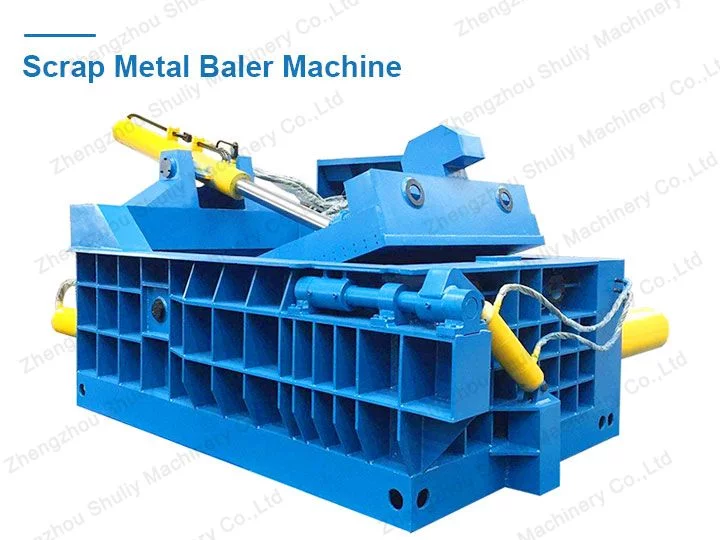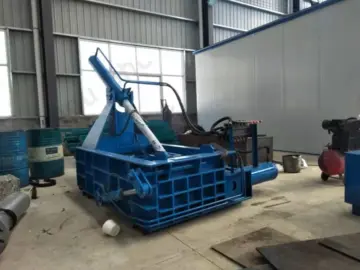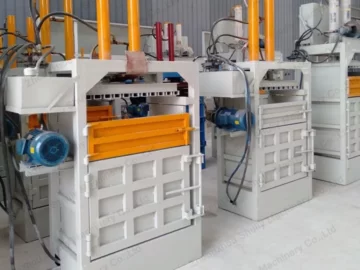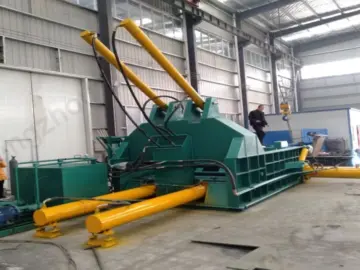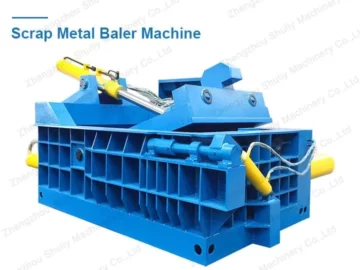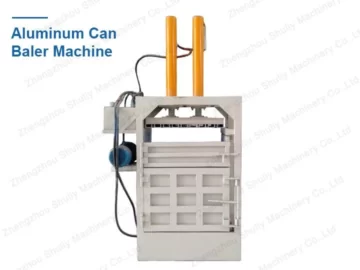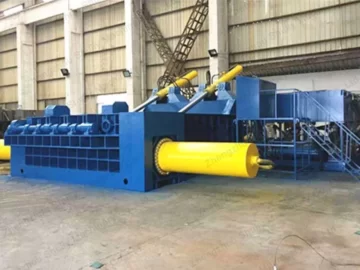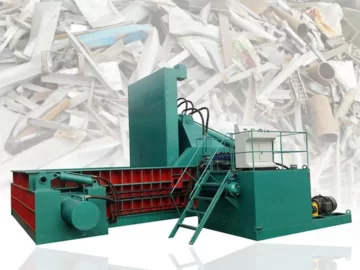Scrap metal baler is indispensable equipment in the recycling industry, facilitating the compression and baling of scrap metal into manageable bales.
This article aims to provide a comprehensive overview of scrap metal balers, including their types, working mechanisms, size options, safety considerations, pricing factors, and information on where to purchase these machines.
How Does a Scrap Metal Baler Work?
- Collection: Gather scrap metal from various sources such as industrial waste, demolition sites, or automotive scrap.
- Preparation: Sort and clean the collected metal while removing any non-metallic materials.
- Loading: Introduce the prepared metal into the baler chamber manually or through conveyor systems.
- Compression: Apply hydraulic pressure to compress the metal, transforming it into dense bales.
- Baling: Secure the compressed bales using wire or straps, ensuring their stability during transportation and storage.
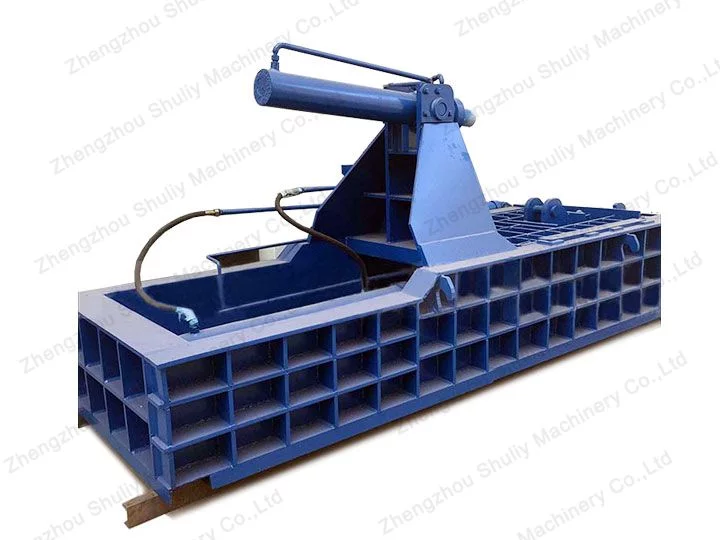
What Are the Size and Capacity Options for Scrap Metal Baler?
Scrap metal balers come in various sizes and capacities, catering to different recycling needs. The size and capacity options vary depending on the manufacturer and model. Common choices include:
- Small to Medium-Sized Balers: Ideal for smaller recycling businesses or facilities with space limitations, these metal scrap baling machine offer lower processing capacities while maintaining affordability and portability.
- Large-Sized Balers: Designed for high-volume processing, these baler machine are commonly utilized in larger recycling operations. They provide increased compression force, higher capacities, and faster cycle times.
- Mobile scrap metal balers: Mounted on trailers or trucks, mobile balers offer mobility and convenience for on-site recycling or serving multiple locations.
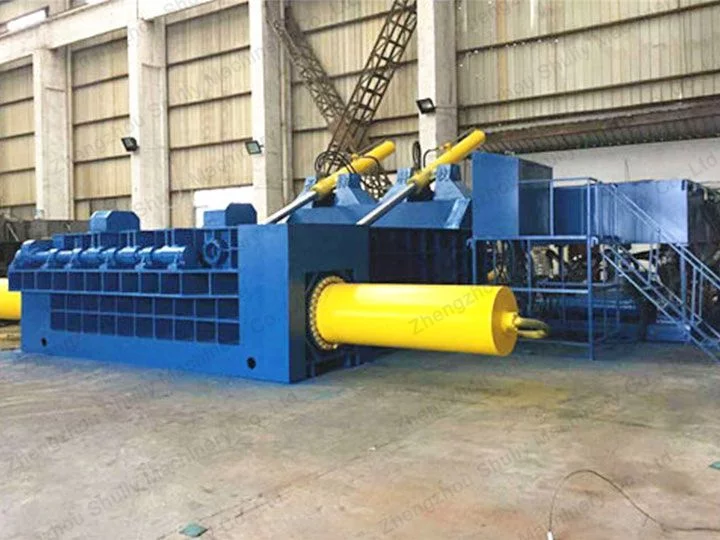
Metal Baler Machine for Sale
Scrap metal baler is an essential tool for efficient scrap metal recycling. In Shuliy baler machinery, we have various baler machine for sale. If you need this machine, please feel free to contact us.
| Model | Nominal Force(kn) | compression chamber(mm) | Block size (mm) | Block density(kg/m 3 ) | Capacity (kg/h) | Single cycle time(s) | power(kw) | Bale Discharging Operation |
| Y81-630 | 630 | 1000× 600×500 | (180-250) ×200×200 | ≥2000 | 500-1000 | ≤90 | 7.5 | Turn over, manual valve operation |
| Y81-1000 | 1000 | 1000× 600×550 | (200-300)×230×230 | ≥2000 | 1000-1200 | ≤120 | 11 | Turn over, manual valve operation |
| Y81-1250 | 1250 | 1200× 700×600 | (150-360) ×300×300 | ≥2000 | 1000-1500 | ≤120 | 11 or 15 | Turn over, manual valve operation |
| Y81/T-1000 | 1000 | 1200× 600×600 | (250-400) ×230×230 | ≥2000 | 1200-1500 | ≤120 | 15 | Push out, manual valve operation |
| (250-400) ×300×300 | ||||||||
| Y81/T-1250A | 1250 | 1200× 700×600 | (240-250) ×240×240 | ≥2000 | 1500-2000 | ≤80 | 18.5 | Push out, manual valve operation |
| Y81/T-1250B | 1250 | 1400× 700×700 | (250-450) ×300×300 | ≥2000 | 1500-2000 | ≤80 | 18.5 | Push out, PLC control operation |
| Y81Q-1350 | 1350 | 1400× 600×600 | (50-300) ×600×240 | ≥2000 | 2500 | ≤150 | 22 | Bag come out from front,manual valve operation |
| Y81/T-1600A | 1600 | 1600× 1000×800 | (400-600) ×350×350 | ≥2000 | 2000-3000 | ≤150 | 22 | Push out, manual valve operation |
| Y81/T-1600B | 1600 | 1600× 1200×800 | (400-650) ×400×400 | ≥2000 | 3000-4000 | ≤160 | 30 | Push out, manual valve operation |
| Y81/T-2000A | 2000 | 1600× 1200×800 | (400-700) ×400×400 | ≥2500 | 4000-5000 | ≤160 | 30 | Push out, manual valve operation |
| Y81/T-2000B | 2000 | 1800× 1400×900 | (400-700) ×400×400 | ≥2500 | 5000-6000 | ≤160 | 37 | Push out, PLC control coperation |
| Y81/T-2500A | 2500 | 2000× 1400×1200 | (450-700) ×450×450 | ≥2500 | 6500-8000 | ≤160 | 44 or 60 | Push out, PLC control coperation |
| Y81/T-2500B | 2500 | 2000× 1750×1200 | (450-800) ×500×500 | ≥2500 | 8500-9500 | ≤160 | 60 | Push out, PLC control coperation |
| Y81/T-3150A | 3150 | 2000× 1400×1200 | (450-700) ×450×450 | ≥3000 | 10000-12000 | ≤160 | 60 | Push out, PLC control coperation |
| Y81/T-3150B | 3150 | 2000× 1750×1200 | (450-800)×500×600 | ≥3000 | 12000-14000 | ≤160 | 60 or 66 | Push out, PLC control coperation |
| Y81/T-4000A | 4000 | 2000× 1600×1200 | (500-1000) ×500×600 | ≥4000 | 15000-17000 | ≤160 | 66 | Push out, PLC control coperation |
| Y81/T-4000B | 4000 | 2600× 2000×1200 | (600-1100) ×500×600 | ≥4000 | 18000-20000 | ≤160 | 110 | Push out, PLC control coperation |

The Advantages of Metal Scrap Baling Machine
- Space Optimization: By compressing scrap metal into the hydraulic metal baler, balers significantly reduce the required storage and transportation space.
- Cost Reduction: Baled metal occupies less volume, resulting in reduced transportation costs and maximizing the value of each load.
- Environmental Benefits: Recycling metal reduces the need for raw material extraction, conserves natural resources, and minimizes landfill waste.
- Increased Efficiency: Balers streamline the recycling process, enhancing overall productivity and reducing labor requirements.
- Revenue Generation: Baled metal commands higher market value, contributing to increased revenue for recycling businesses.
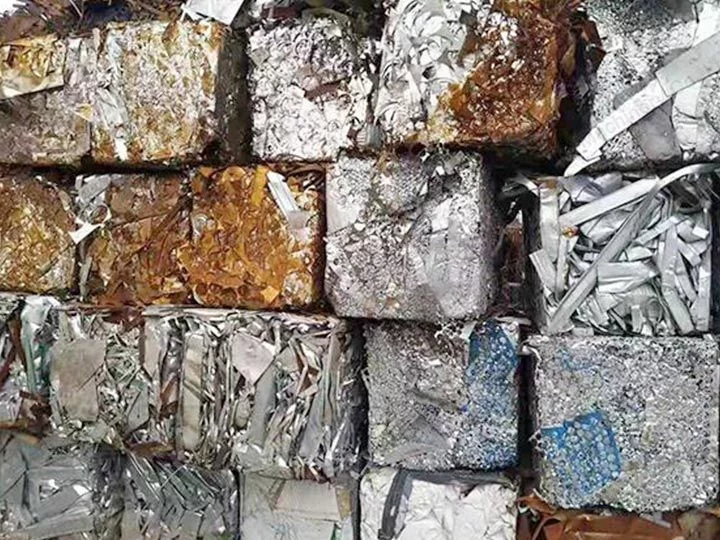
Types of Scrap Metal Baler Machines
There are various types of metal baler machines available, each catering to specific needs. Some common types include:
- Vertical Balers: These balers compress metal vertically and are suitable for smaller operations with limited space.
- Horizontal Balers: Horizontal balers compress metal horizontally and are commonly used in larger recycling facilities due to their high capacity and efficiency.
- Automatic metal baler: These advanced balers feature automated features that enhance efficiency and productivity. They can automatically feed, compress, tie, and eject bales, reducing the need for manual labor.
- Shear Balers: Shear balers combine the functions of a baler and a shear. They are capable of both cutting and compressing scrap metal, making them suitable for processing larger and bulkier metal materials.
- Alligator Shears: While not technically a hydraulic metal baler, alligator shears are often used in conjunction with balers. They are designed to cut scrap metal into smaller pieces before being fed into the baler for compression.
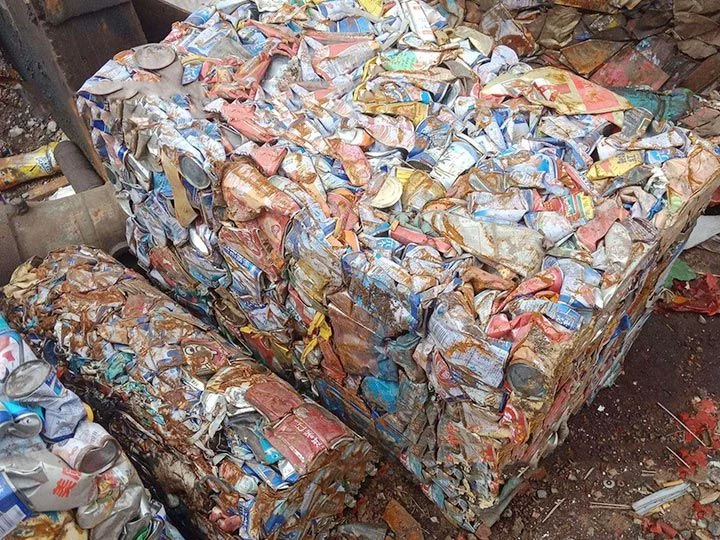
The Price of Metal Baler Machines
The pricing of metal baler machines can vary depending on various factors, including the manufacturer, model, size, capacity, and additional features. To determine the specific price range, it is recommended to contact baler machine manufacturer. We can provide accurate and up-to-date information on pricing based on individual requirements and specifications.
Where to Buy Metal Baler Machines?
Metal baler machines can be purchased from various sources, including:
- Manufacturers: Contacting manufacturers directly allows you to explore their product offerings, specifications, and pricing. They can also provide valuable guidance and support during the purchasing process.
- Distributors: Authorized distributors of metal baler machines offer a wide selection of models from different manufacturers. They can provide assistance in choosing the right machine and offer after-sales services.
- Online Marketplaces: Online platforms and marketplaces dedicated to industrial equipment often feature metal baler machines. These platforms allow you to compare different models, read customer reviews, and make purchases conveniently.
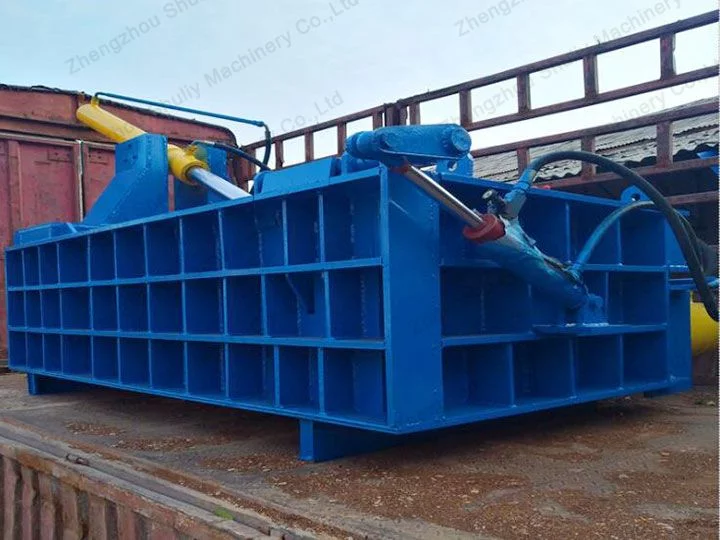
What Are the Safety Precautions to Consider When Using a Scrap Metal Baler?
- Training: Only trained and authorized personnel should operate the baler, equipped with a comprehensive understanding of its functioning and safety protocols.
- Maintenance: Regular maintenance and inspections should be conducted to ensure the baler’s proper functioning and identify any potential hazards.
- Safety Guards and Emergency Stops: Install safety guards and emergency stop buttons on the metal scrap baling machine to prevent accidents and address emergencies promptly.
- Personal Protective Equipment (PPE): Operators must wear appropriate PPE, including gloves, safety glasses, and protective clothing, to mitigate the risk of injuries.
- Material Inspection: Thoroughly inspect the metal being fed into the baler to avoid the inclusion of hazardous or prohibited materials that may endanger the operator or the machine.

